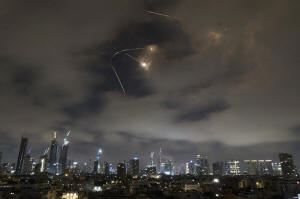Israel hits Iranian nuclear research facility as war continues into
second week
[June 21, 2025]
By DAVID RISING and SAM MEDNICK
TEL AVIV, Israel (AP) — Israel's military said Saturday it struck an
Iranian nuclear research facility overnight and killed three senior
Iranian commanders in targeted attacks as the war between the two
nations continued into a second week.
Early Saturday, smoke could be seen rising from an area near a mountain
in Isfahan, where a local official said Israel had attacked the nuclear
research facility in two waves.
The target was two centrifuge production sites, and the attacks came on
top of strikes on other centrifuge production sites elsewhere in recent
days, according to an Israeli military official speaking on condition of
anonymity under army guidelines to brief reporters. It was the second
attack on Isfahan, which was hit in the first 24 hours of the war as
part of Israel's goal to destroy the Iranian nuclear program.
Akbar Salehi, Isfahan province's deputy governor for security affairs,
confirmed the Israeli strikes had caused damage to the facility but said
there had been no human casualties.
Iran launched a new wave of drones and missiles at Israel but there were
no immediate reports of significant damage, and the Israeli official
called it a “small barrage” that was largely intercepted by Israel's
defenses.
The official said part of the reason that Iran's overnight attack had
been relatively small was that the military had been targeting its
launchers, and estimates it has now taken out more than 50% of them.
“We've been able to take out a large amount of their launchers, creating
a bottleneck — we're making it harder for them to fire toward Israel,”
he said. “Having said all that, I want to say the Iranian regime
obviously still has capabilities.”
Israel's Magen David Adom rescue service said Saturday an Iranian drone
hit a two-story building in northern Israel, but there were no
casualties.

Talks in Switzerland fail to produce diplomatic breakthrough
The ongoing fighting comes after talks in Geneva on Friday failed to
produce a diplomatic breakthrough.
European officials expressed hope for future discussions, and Iranian
Foreign Minister Abbas Araghchi said he was open to further dialogue
while emphasizing that Tehran had no interest in negotiating with the
U.S. while Israel continued attacking.
“Iran is ready to consider diplomacy once again and once aggression is
stopped and the aggressor is held accountable for the crimes committed,”
he told reporters.
No date was set for the next round of talks.
Iran warns against U.S. becoming militarily involved
U.S. President Donald Trump is weighing active U.S. military involvement
in the conflict, which Araghchi said Saturday “would be very
unfortunate.”
“I think that it would be very, very dangerous for everyone,” he said in
Istanbul, speaking on the sidelines of a meeting of the Organization of
Islamic Cooperation.
The war between Israel and Iran erupted June 13, with Israeli airstrikes
targeting nuclear and military sites, top generals and nuclear
scientists. At least 657 people, including 263 civilians, have been
killed in Iran and more than 2,000 wounded, according to a
Washington-based Iranian human rights group.
Iran has retaliated by firing more than 450 missiles and 1,000 drones at
Israel, according to Israeli army estimates. Most have been shot down by
Israel’s multitiered air defenses, but at least 24 people in Israel have
been killed and hundreds wounded.
Israeli Prime Minister Benjamin Netanyahu has said Israel’s military
operation in Iran would continue “for as long as it takes” to eliminate
what he called the existential threat of Iran’s nuclear program and
arsenal of ballistic missiles.
But Netanyahu's goal could be out of reach without U.S. help. Barring a
commando raid or even a nuclear strike, Iran’s underground Fordo uranium
enrichment facility is considered to be out of reach to all but
America’s “bunker-buster” bombs. Trump said he would put off deciding
whether to join Israel’s air campaign against Iran for up to two weeks.

[to top of second column]
|

Israeli air defense system fires to intercept missiles during an
Iranian attack over Tel Aviv, Israel, Saturday, June 21, 2025. (AP
Photo/Leo Correa)

Israel continues targeted attacks on Iranian military commanders
In Israel's opening attack, it killed three of Iran’s top military
leaders: one who oversaw the entire armed forces, Gen. Mohammad
Bagheri; one who led the paramilitary Revolutionary Guard, Gen.
Hossein Salami; and the head of the Guard’s ballistic missile
program, Gen. Amir Ali Hajizadeh.
The targeted killings of senior commanders continued, with Israel's
defense minister saying Saturday that the military had killed a
commander in Iran's paramilitary Revolutionary Guard who financed
and armed Hamas in preparation for the Oct. 7, 2023, attack on
Israel that sparked the 20-month long war in Gaza.
Israel said Saeed Izadi was commander of the Palestine Corps for the
Iranian Quds Force, an elite arm of the Guard that conducts military
and intelligence operations outside Iran, and that he was killed in
an apartment in the city of Qom.
Iranian officials did not immediately confirm the death, but the Qom
governor's office did say there had been an attack on a four-story
apartment building and local media reported two people had been
killed.
Israel also said it had killed the commander of the Quds Force's
weapons transfer unit, who it said was responsible for providing
weapons to Hezbollah and Hamas. Behnam Shahriyari was killed in his
car while traveling in western Iran, the military said.
A commander of Iran's drone force was also killed overnight, the
Israeli official who briefed reporters said.
Iran threatens head of U.N. nuclear watchdog
On Friday, the head of the U.N. nuclear watchdog warned at an
emergency meeting of the U.N. Security Council against attacks on
Iran’s nuclear reactors, particularly its only commercial nuclear
power plant in the southern city of Bushehr.
“I want to make it absolutely and completely clear: In case of an
attack on the Bushehr nuclear power plant, a direct hit would result
in a very high release of radioactivity to the environment,” said
Rafael Grossi, head of the International Atomic Energy Agency. “This
is the nuclear site in Iran where the consequences could be most
serious.”
Israel has not targeted Iran’s nuclear reactors, instead focusing
its strikes on the main uranium enrichment facility at Natanz,
centrifuge workshops near Tehran, laboratories in Isfahan and the
country’s Arak heavy water reactor southwest of the capital.

Iran previously agreed to limit its uranium enrichment and allow
international inspectors access to its nuclear sites under a 2015
deal with the U.S., France, China, Russia, Britain and Germany in
exchange for sanctions relief. But after Trump pulled the U.S.
unilaterally out of the deal during his first term, Iran began
enriching uranium up to 60% — a short, technical step away from
weapons-grade levels of 90% — and restricting access to its nuclear
facilities.
Iran has long maintained its nuclear program is for peaceful
purposes, but it is the only non-nuclear-weapon state to enrich
uranium up to 60%. Israel is widely believed to be the only Middle
Eastern country with a nuclear weapons program but has never
acknowledged it.
Leaders in Iran have blamed Grossi's statements about the status of
Iran's nuclear program for prompting Israel's attack.
On Saturday, a senior adviser for Iran’s Supreme Leader Ali Khamanei,
Ali Larijani, said in a brief social media post without elaboration
that Iran would make Grossi “pay” once the war with Israel is over.
_____
Rising reported from Dubai, United Arab Emirates. Mehmet Guzel in
Istanbul and Farnoush Amiri in Dubai contributed to this report.
All contents © copyright 2025 Associated Press. All rights reserved |